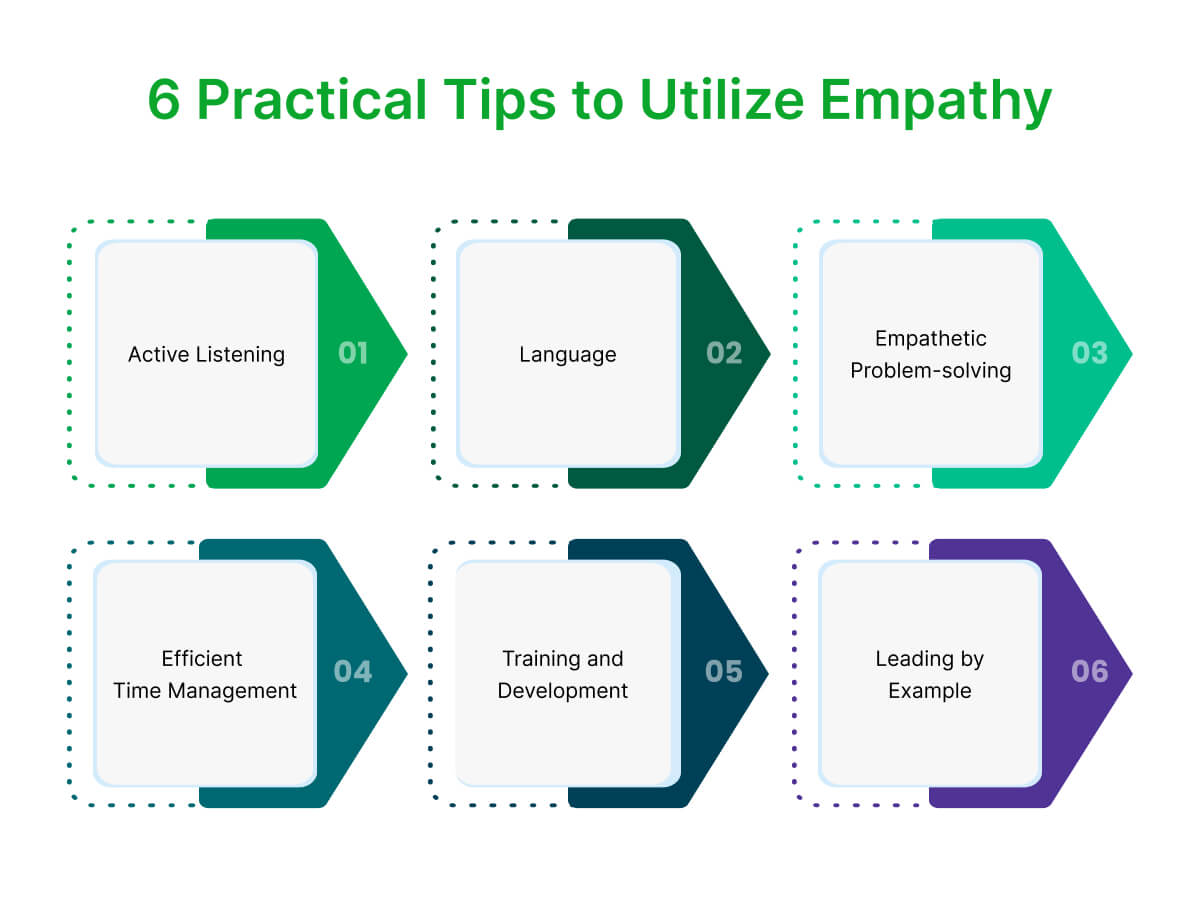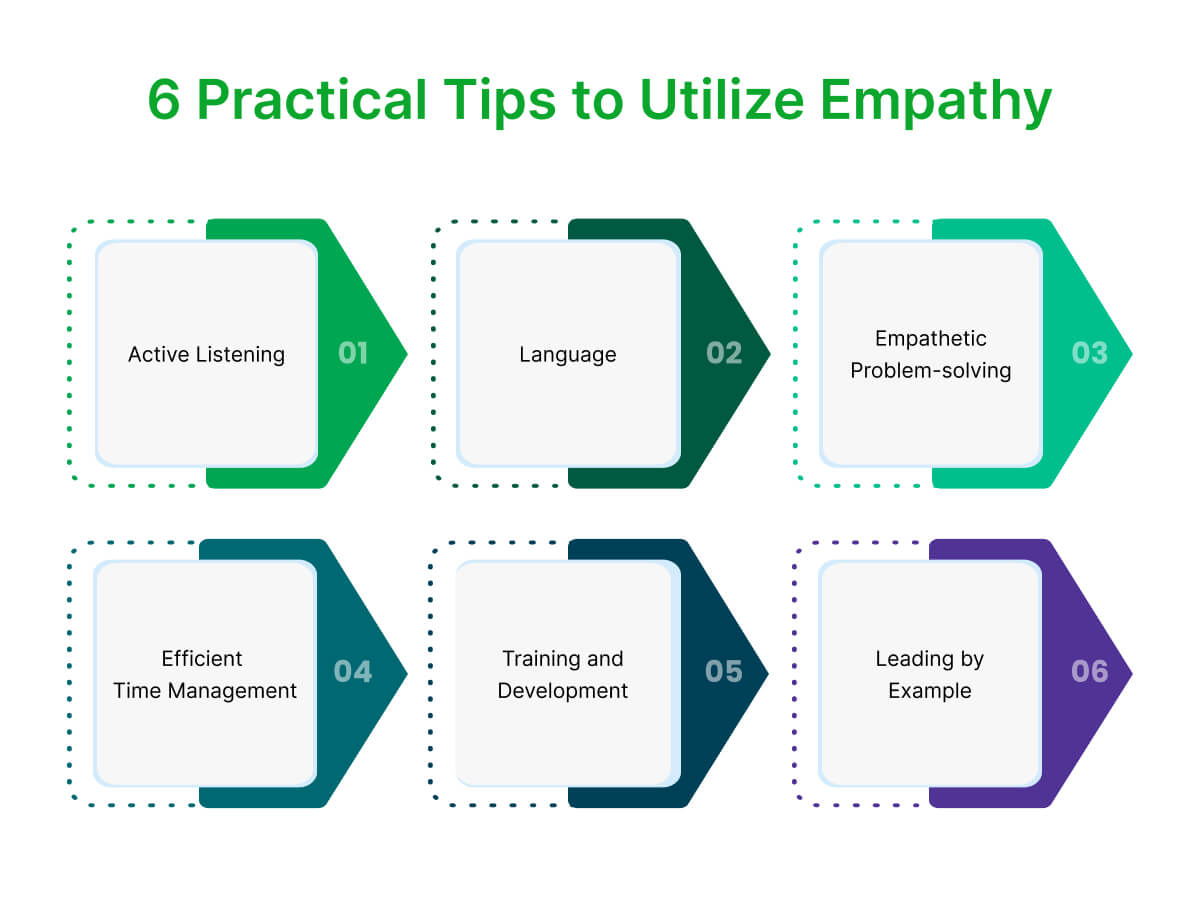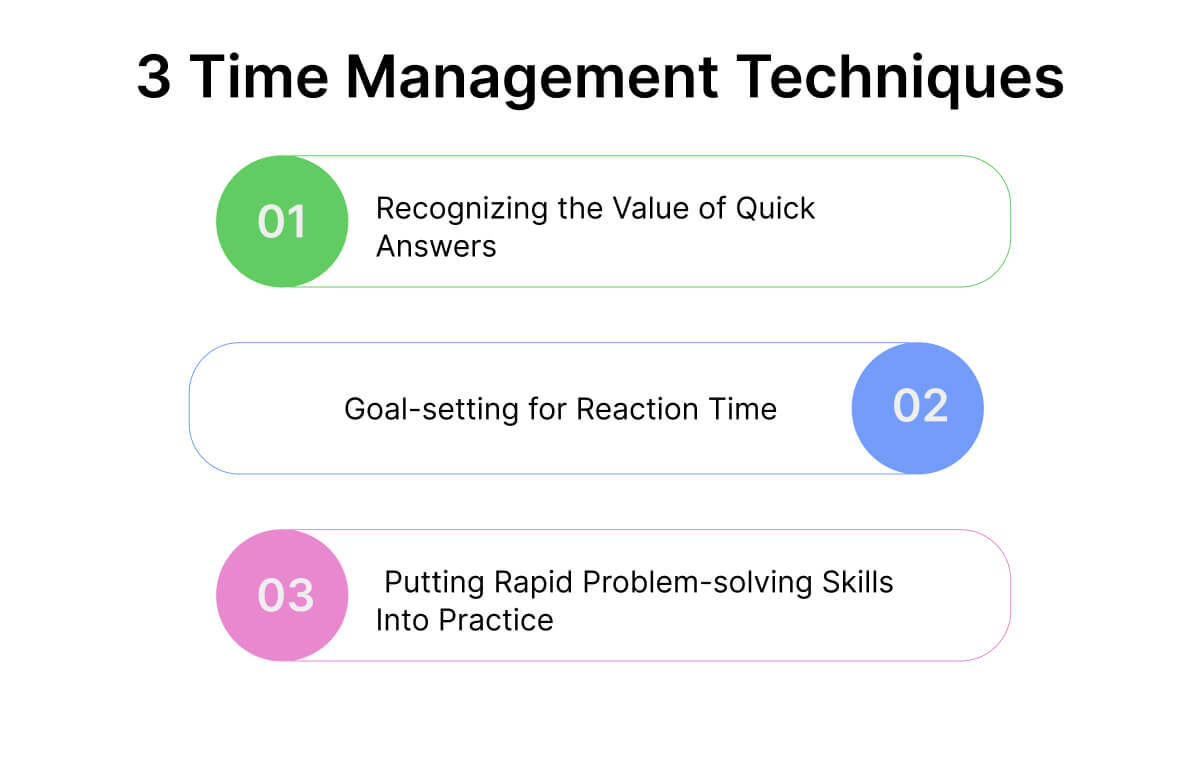 Customer Service
Customer Service

10 October, 2023

Whether you are a business owner, manager, or front-line employee, developing your customer service skills is a great asset. To keep current consumers and attract new ones, you must improve your customer service skills.
In this post, we’ll look at 10 crucial suggestions to assist you in improving your customer service abilities and leaving a positive impression on your consumers. Let’s learn more about what customer service is, customer service strategy and how you can improve it!
Contents
In today’s competitive business environment, mastering customer service skills is crucial. Learn effective strategies to enhance your customer interactions.
Here are 10 tips on How to improve customer service skills and leave a lasting positive impact on your customers.

Empathy isn’t just a word, it’s a philosophy that can transform how we interact with customers, enhancing their service experience. If you want to improve your customer service skills, then you can follow this topic. In the world of customer service, where interactions range from simple inquiries to complex problem-solving, infusing empathy into every interaction can have a significant impact.
Here are some practical tips to utilize empathy:
Empathy goes beyond being just a soft skill. It’s a powerful tool that can completely transform the way we deliver customer service. By incorporating empathy into all your customer interactions, you have the power to make a significant and long-lasting impact on their experience with your service.
A key quality to providing excellent customer service is being curious. Why? This can be one of the ways to improve your skills in providing customer service Individuals with a curious nature tend to pose more insightful questions, uncover profound insights, and tackle intricate issues more effectively.
Furthermore, curiosity has the ability to mitigate defensiveness and aggression in challenging circumstances. Here’s a breakdown of how to effectively use questions to create curiosity:
Use your talent for asking thought-provoking questions to create an interactive and captivating atmosphere with your customers. This approach encourages people to actively seek out knowledge, explore new concepts, and embark on a journey of self-discovery. Your ability to engage individuals in this way makes you an effective and inspiring communicator.
It is pivotal to improving effective customer service. When you focus intently on your customers, you gain valuable insights into their needs, concerns, and preferences. Employ non-verbal cues and this not only helps you understand their message deeply but also makes them feel heard and valued. Avoid interrupting but instead, allow them to express themselves completely.
By refining this skill, you establish trust, gather precise information, and set the stage for providing tailored and impactful solutions. In the realm of customer service, listening is the key to unlocking satisfaction and loyalty.
Actively and attentively listening in customer service helps build trust, show respect, and demonstrate your commitment to meeting the customer’s needs. By understanding their concerns thoroughly, you can provide more accurate and practical solutions, leading to improved customer satisfaction and a positive overall experience.
If you want to improve your customer service skills, it’s important to have great communication skills. Being able to express yourself clearly and concisely is key to customer satisfaction. So work on your verbal ability, and you’ll be on your way to providing top-notch customer service! Important components of strong communication skills are clarity, confidence, respectful tone, context, use of technology, open-mindedness, empathy, active listening, etc.
In almost every area of life where connection and information exchange take place, strong communication skills are essential. This includes interpersonal interactions, professional settings, and everyday situations.
Strong communication abilities Developing these skills enhances personal and professional growth, fosters effective teamwork, and empowers individuals to convey their ideas with impact and clarity.

Challenges and challenging circumstances are common in the customer service industry.
The degree to which a business handles these situations can have a significant effect on client happiness, brand loyalty, and reputation.
A skill that not only effectively solves problems but also leaves a great impression on clients is the ability to handle challenging situations with patience.
Refrain from taking criticism personally and concentrate on solving the current problem.
Provide doable solutions to deal with the problem and make the situation better. Consumers value problem-solving that is proactive.
Handling difficult situations with patience is a testament to a company’s commitment to customer satisfaction. It turns challenging moments into opportunities to showcase excellent service and problem-solving skills. By actively listening, remaining composed, and offering practical solutions, companies can turn frustrated customers into loyal advocates.
A thorough understanding of the goods and services a company provides is one of the fundamental pillars of success in the field of customer service. Product and service expertise may have a big impact on customer interactions, satisfaction, and overall business growth. It’s not just good to have but it’s essential.
Customers are more likely to feel valued and happy after a contact when they believe their inquiries have been fully understood and addressed.
Product and service knowledge is the key that unlocks the door to customer satisfaction and business growth.
The quest for improvement is a continuous effort in the changing world of business and customer service. Customers’ feedback is one of the most effective tools at a company’s disposal. Customer happiness may be increased, processes can be improved, and a company’s reputation can be strengthened by actively seeking feedback and using it as a basis for development.
It gives businesses a path to improving their offers and services by revealing insights into their experiences, preferences, and pain concerns.
By communicating with customers directly or through surveys, reviews, or other means, you can make sure they know how much you value and will use their feedback.
See criticism as a chance to improve rather than seeing it negatively.
Address particular problems, make changes, and let people know when things are better.
Companies may maintain their agility, customer-centricity, and competitiveness by actively soliciting customer ideas, leveraging feedback to drive changes, and integrating it into the decision-making process.
Time is important in the fast-paced business of good customer service. Consumers anticipate prompt answers to their questions and resolutions to their problems. Good time management boosts client happiness while also increasing customer service teams’ effectiveness and productivity.

Effective time management in customer service is about finding the balance between speed and quality. Quick actions are vital, but they should not compromise the accuracy and thoroughness of responses
In the realm of customer service, one size does not fit all. Every customer is unique, with individual preferences, needs, and expectations. It was a very big part of improving customer service skills.
Let’s delve into how personalization makes a big difference and why it’s a game-changer in the world of customer service.
A company that goes above and beyond to treat its customers with exceptional attention is more likely to stick in their minds.
Customization adds a personal touch to interactions, fostering a deeper and more meaningful relationship.
Customization has become an essential strategic component in a world where client expectations are constantly increasing. It’s more than simply a fad so it represents a fundamental change in how businesses view customer service. Personalization acknowledges that each consumer is an individual with specific wants and preferences
In the customer service sector, the idea of ownership is powerful since it goes beyond doing tasks. It exemplifies the notion of accepting complete accountability for guaranteeing that a customer’s problem or worry is fixed to their satisfaction.
Let’s talk about the importance of ownership in providing excellent customer service and how it may elevate conversations.
This builds trust and confidence in the company’s ability to address issues effectively.
Rather than passing the buck, employees focus on finding solutions, even if it requires collaboration with other departments.
Ownership is not just a task, it’s a mindset. It’s the recognition that every customer interaction is an opportunity to create a positive impression. It’s the commitment to seeing challenges through and providing resolutions that exceed expectations.
In customer service, effective communication is paramount. It’s the means through which information is exchanged between a customer and a service representative. Strong communication skills allow for a smooth and positive interaction, which in turn leads to higher customer satisfaction.
Some effective communication skills in customer service strategy
By focusing on these aspects, individuals in customer service roles can enhance their ability to effectively communicate with customers, leading to more positive and successful interactions.
Call centers are unique work environments that handle a high volume of customer interactions primarily through telephone or digital channels. The skills required in this setting are tailored to efficiently and effectively manage these interactions.
The customer service strategies and skills that are particularly important for call center agents.
By emphasizing these skills, call center agents can excel in their roles, providing excellent service to customers over the phone or through digital channels. This contributes to overall customer satisfaction and helps the call center achieve its goals.
Addressing an upset customer’s concerns strategically requires a thoughtful approach. This involves problem-solving with patience and empathy while keeping your composure intact.
Let’s explore this approach in some steps with detailed examples:
Listen: Allow the customer to express their concern.
Example: A customer is upset about receiving a damaged package.
Empathize: Show understanding and empathy.
Example: “Good day, Miss Helen. I regret hearing about the package’s damage. I am aware of how annoying that can be.”
Apologize: Offer a sincere apology.
Example: “I apologize for the inconvenience.”
Resolve: Offer a solution or options for resolution.
Example: “Sorry, Mr. John, We can send you a replacement package immediately.”
Follow-up: Ensure the issue is resolved and follow up with the customer.
Document: Document the issue for future reference and improvement.
By following these steps, you can effectively address the customer’s concern and turn a negative experience into a positive one.
It’s important to respond honestly and professionally. When you can’t answer a customer’s question, it’s okay to admit it. Assure the customer that you’ll find out and get back to them promptly Here are several key steps to handle this situation:
Be honest: admit that you don’t have the information they’re looking for. Honesty builds trust and credibility
Assure them: Let the customer know that you will find out the answer for them.
Escalate if needed: If the question is complex or requires specialized knowledge, improve your team’s customer service to a more knowledgeable team member or supervisor.
Provide a timeline: Give the customer an estimated timeframe within which you will get back to them with accurate information.
Follow up promptly: Research the answer and reach out to the customer within the promised timeframe.
Your willingness to help and follow up demonstrates your commitment to excellent customer service.
Teamwork is an essential element that can make or break customer satisfaction. The way customers are treated relies heavily on the collective effort of a team working together. Without it, the customer experience may suffer, but with it, the possibilities are limitless.
Teamwork enhances customer service by leveraging the diverse talents and knowledge of team members. It fosters a customer-centric culture where every team member contributes to delivering exceptional experiences. Effective teamwork leads to improved problem-solving, streamlined processes, and ultimately higher levels of customer satisfaction.
The ability to develop and continuously improve a company’s offerings is made possible by the feedback it receives from customers. By actively seeking, listening to, and acting on customer feedback, businesses can enhance customer satisfaction, loyalty, and overall success.
While personalized customer service may require additional effort and attention, the benefits in terms of customer satisfaction and loyalty make it a worthwhile investment. The time spent tailoring interactions to individual customer needs often leads to enhanced customer experiences and long-term relationships.
By showing customers that their preferences and concerns are valued, businesses can foster stronger connections and differentiate themselves in a competitive market. Therefore, although personalized customer service may demand more time, the positive impact it has on customer relationships and overall business success outweighs the investment.
Enhancing your customer service skills is a continuous journey that requires dedication and a genuine desire to serve. By prioritizing empathy, communication, and continuous improvement, you can not only meet but exceed customer expectations, setting your business on a path to success.
As you walk the road of effective communication, listening actively, showing empathy, and solving problems, keep in mind that every interaction is a chance to make a strong impact.
By always improving your skills and embracing the ability to understand and meet customer needs, you’re not only offering service but you’re crafting experiences.
So, you need to move ahead with assurance, equipped with the know-how to transform challenges into chances and customers into devoted supporters.